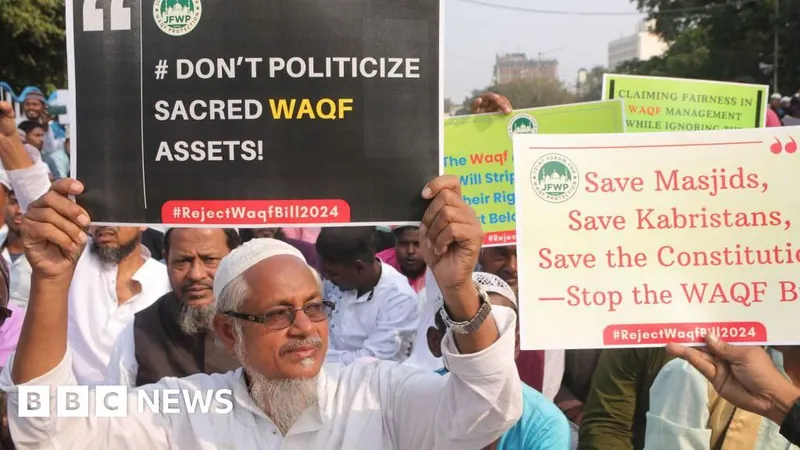
Waqf Bill: India's Parliament Approves Controversial Muslim Land Legislation Amid Major Backlash
2025-04-04
Author: Lok
In a highly contentious session, India's Parliament has officially passed the Waqf (Amendment) Bill, 2024, which aims to redefine the management of historically significant Muslim properties valued at billions of dollars. This decision came after extensive debates and fierce opposition protests from various political and religious leaders.
The bill, which was approved by the upper house early Friday, follows its passage through the lower house the previous day, amid protests from opposition parties who labeled it as unconstitutional and a direct infringement on the rights of India's Muslim minority.
Prime Minister Narendra Modi heralded the bill's passage as a "watershed moment" for the management of waqf properties, which he claimed have been plagued by a lack of transparency and accountability for decades. In a post on social media platform X, he stated that this legislation will not only improve transparency but also protect the rights of individuals.
However, the opposition has expressed serious concerns regarding the government's intention, framing the bill as another tactic by the ruling Bharatiya Janata Party (BJP) to undermine minority rights. Congress leader Mallikarjun Kharge pointed out that although 288 members voted in favor of the bill, a large contingent of 232 voted against it, indicating substantial dissent.
Adding to the legislative controversy, Asaduddin Owaisi, president of the All India Majlis-e-Ittehadul Muslimeen party and a sharp critic of the bill, has taken legal action by challenging it in the Supreme Court, asserting that it jeopardizes the established rights of Muslim communities.
Understanding Waqf Properties
Waqf properties, rooted in Islamic tradition, refer to charitable or religious donations made by Muslims for communal benefits. These properties serve vital functions for India's 200 million Muslims, encompassing mosques, madrassas, orphanages, and graveyards. Governed by the Waqf Act of 1995, the oversight of these properties involves state-level boards comprised of government nominees, Muslim lawmakers, and Islamic scholars, among others.
The BJP government introduced this amendment last August, arguing that the proposed changes aim to modernize waqf property management and close existing legal loopholes. Detractors, however, contend that these amendments would disproportionately empower the government over these community-owned assets.
Key Changes in the Waqf Bill
Several controversial changes are central to the new bill, stirring significant debate. Notably, the legislation amends how waqf properties are designated. Traditionally, many properties were recognized as waqf based on oral traditions and community usage. The new framework requires documented proof for properties to be classified as waqf, particularly concerning government-owned land disputes where the government will have the final say.
Additionally, the bill introduces provisions for non-Muslim appointments on waqf boards and tribunals, raising alarms about potential biases. Judicial intervention is now allowed in disputes, countering the previous system that upheld waqf tribunal decisions as final. Furthermore, the bill mandates a centralized registration system requiring all waqf properties to be registered within six months regardless of their historical recognition.
With these sweeping changes, the Waqf Bill could have profound implications for the future management of Muslim properties in India, reinforcing fears among many that it is a veiled attempt to increase state control over religious and community assets. The response from Muslim leaders and community members continues to unfold, as many await the president’s formal assent for the bill to become law.



 Brasil (PT)
Brasil (PT)
 Canada (EN)
Canada (EN)
 Chile (ES)
Chile (ES)
 Česko (CS)
Česko (CS)
 대한민국 (KO)
대한민국 (KO)
 España (ES)
España (ES)
 France (FR)
France (FR)
 Hong Kong (EN)
Hong Kong (EN)
 Italia (IT)
Italia (IT)
 日本 (JA)
日本 (JA)
 Magyarország (HU)
Magyarország (HU)
 Norge (NO)
Norge (NO)
 Polska (PL)
Polska (PL)
 Schweiz (DE)
Schweiz (DE)
 Singapore (EN)
Singapore (EN)
 Sverige (SV)
Sverige (SV)
 Suomi (FI)
Suomi (FI)
 Türkiye (TR)
Türkiye (TR)
 الإمارات العربية المتحدة (AR)
الإمارات العربية المتحدة (AR)